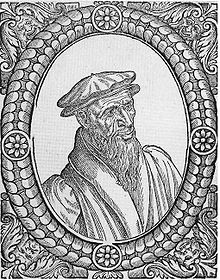William Farel

William Farel (Guillaume Farel, 1489 – September 13 1565), was a French evangelist, and a founder of the Reformed Church in the cantons of Neuchâtel, Berne and Geneva, and the Canton of Vaud Switzerland. He is most often remembered for having persuaded John Calvin to remain in Geneva in 1536, and for persuading him to return there in 1541, after their expulsion in 1538. They influenced the government of Geneva to the point that it became a theocratic state, the "Protestant Rome", where Protestants took refuge and non-Protestants were persecuted. Together with Calvin, Farel worked to train missionary preachers who spread the Protestant cause to other countries, and especially to France.
Farel was a fiery preacher and an energetic critic of the Roman Catholic Church. In the earliest years of the Reformation in France, he was a pupil of the pro-reform Catholic priest, Jacques Lefevre d'Etaples. With Lefevre he became a member of the Cercle de Meaux gathered together from 1519 by the reform-minded bishop of Meaux, Guillaume Briçonnet, who invited a number of evangelical Humanists to work in his diocese to help implement his reform program within the Catholic Church. This group of Humanists also included Josse van Clichtove, Martial Mazurier, Gérard Roussel, and François Vatable. The members of the Meaux circle were of different talents but they generally emphasized the study of the Bible and a return to the theology of the early Church. While working with Lefevre in Meaux, Farel came under the influence of Lutheran ideas and became an avid promoter of them. After condemnation by the Sorbonne, Farel evangelized fervently in the Dauphiné.

He was forced to flee to Switzerland because of controversy that was aroused by his writings against the use of images in Christian worship. He spent time at Zurich with Ulrich Zwingli and at Strasbourg, with Martin Bucer. He convinced Neuchâtel to join the Reform in 1530.
He established himself in Geneva in 1532, where he remained as minister, drawing Calvin to the city, but breaking with him over the Eucharist. He was banished from Geneva in 1538, in part for his rigorous positions, and retired to Neuchâtel, where he died.

Interesting to note that as Calvin's friend, Farel was a promoter of Lutheran ideas in his youth. Today Calvinism and Lutheranism are two complete separate denominations, but Farel's relationship with both would show they had more in common than what they share today.
See also
